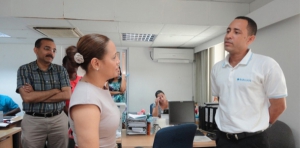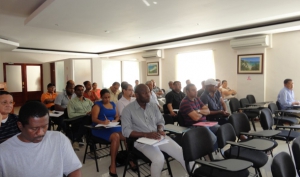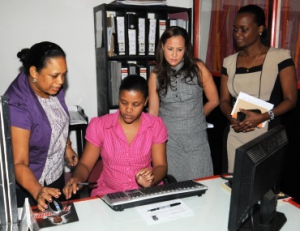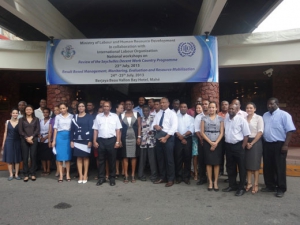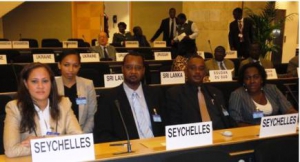Ministerial Visit to Barclays Bank (Seychelles) Limited
The Minister for Labour and Human Resource Development, Ms Idith Alexander, this morning visited Barclays Bank (Seychelles) Limited. This visit is part of the Ministry’s policy of fostering a closer working relationship with the private sector that is based on mutual dialogue and understanding.
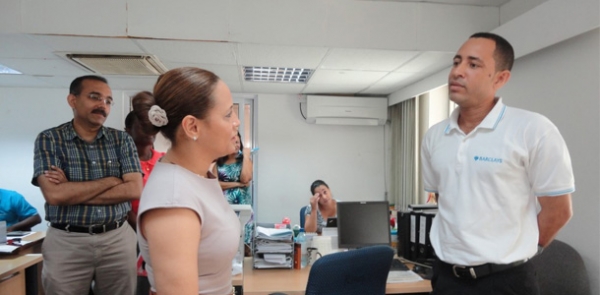
The Minister, accompanied by high officials from her Ministry was greeted by the Managing Director for Barclays Bank, Mr Rakesh Jha and two members of his management team. The Ministerial delegation was taken on a tour of the Capital City branch after which they were introduced to the members of the Barclays Bank management team.
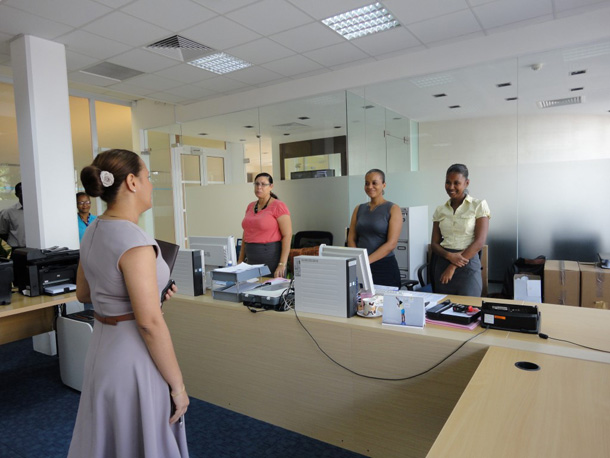
The visit then moved on to the Independence Avenue Branch, the Corporate (Market) Branch, the Providence Branch and finally the Operations Centre which is also located at Providence. At each of the locations visited, the Minister spoke to staff members who informed her that the minor issues they have put forward are being addressed by the management team. The majority of the staff spoken to expressed their satisfaction with the current work environment and condition.
A number of staff members have been working with Barclays Bank for over 25 years with one staff member being with the bank for 41 years.
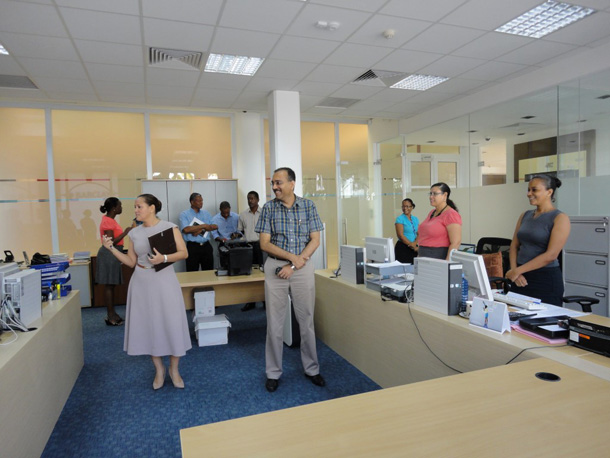
At the end of the visit, the discussions focused around human resource development and staff retention. Mr Jha informed the Minister that a lot is being done by the Bank in these areas. For example, they have an executive leadership team whereby Seychellois workers are being trained to take up the posts currently being occupied by non-Seychellois in the future. The Minister commented that “This is in essence what the Ministry had in mind when it launched the Localization plan in February this year. It is good to see that your Bank has already started working on your Localization plan”.
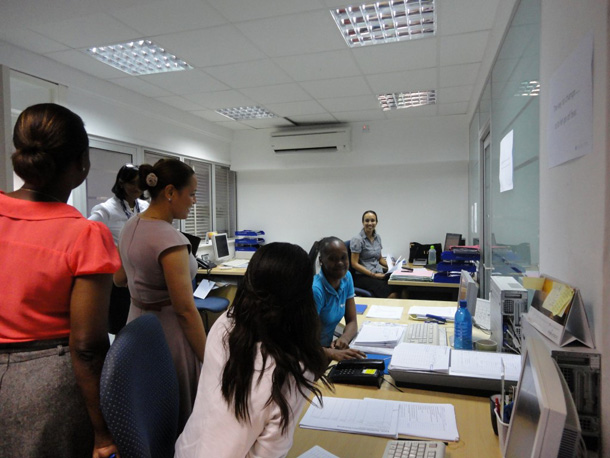
The Bank has also developed a Certificate in Banking, in collaboration with the University of Seychelles, which will be offered to staff as well as non- banking individuals who wish to follow the course. In addition, staff members have the opportunity to follow short courses both locally and overseas.
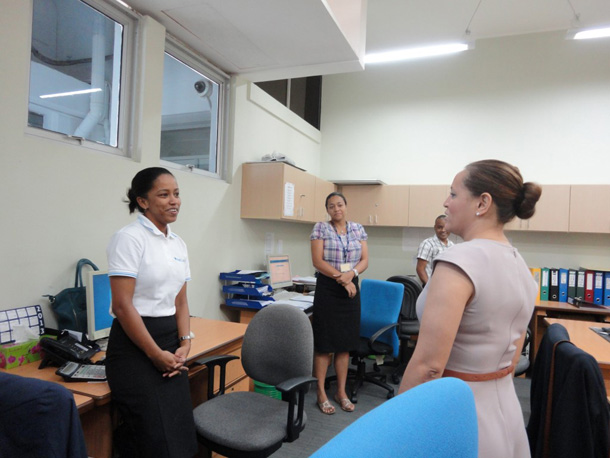
Furthermore incentives such as fully paid weekend breaks are offered to long serving staff. As a way of improving staff welfare, it is on the agenda for a crèche to be identified which staff can make use of to leave their children while they are at work.
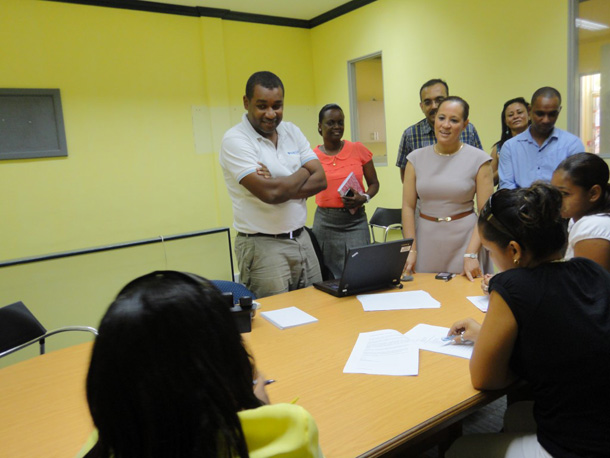
The Minister assured the Mr Jha and his team of her Ministry’s support and assistance with the recruitment of reliable candidates and with their training plan.
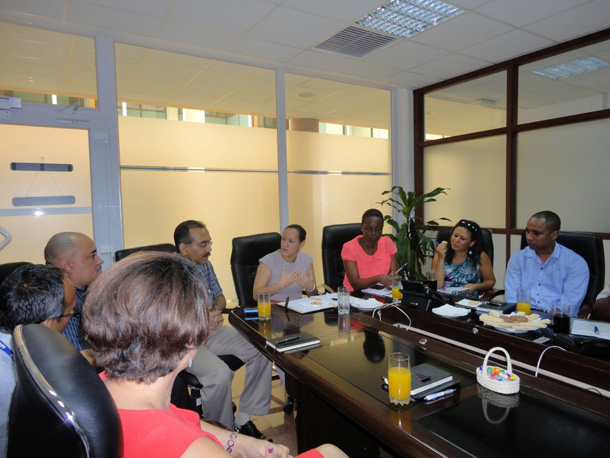
Mr Jha thanked the Minister for the visit and assured her that they are open to the idea of working closely with the Ministry as well as recruiting individuals who have completed or are on the Skills Development Schemes with the Ministry.
Validation workshop of the national employment policy
The Validation Workshop for the National Employment Policy came to a close on Friday 17th May 2013, with the presentation of proposals from the working groups and the way forward from the Tripartite Panel.
The Tripartite Panel consisted of officials from the Ministry of Labour and Human Resource Development and representatives from the employers and workers’ organizations.

The employers and workers’ representatives expressed their appreciation for having been consulted and involved in the technical review of the National Employment Policy, this in turn has instilled in them a sense of ownership towards the Policy.
On the part of the Ministry of Labour and Human Resource Development, it was advised for the Consultant to meet with members of the private sector at the next Human Resources Forum, scheduled for the end of May, to seek their views before the policy is finalized, given that the private sector has an important role to play in implementing the Policy.

The Ministry reiterated their commitment towards implementing the policy, promoting and disseminating key principles and objectives of the Policy to the population.
The ILO representatives pointed out that the workshop “was very participatory, very consultative and very positive.”
All agreed that the deliberations were very informative and relevant to the proposed strategies of the Policy. The Ministry thanked the ILO for their technical expertise throughout the review process of the Employment Policy for Seychelles.

The overall outcome of the validation workshop was successful and has contributed in moving closer towards the adoption of a new Employment policy for Seychelles.

Consultative Meeting with Representatives of Construction Companies
A consultative meeting was held on Saturday 25th May at the Maison de Mahe between Government representatives and a number of construction companies in line with the Government’s ongoing consultative process aimed at addressing some of the concerns raised in recent weeks by the Truck Operators Association.
The Government felt that this meeting was necessary to give the Construction sector an opportunity to respond to these concerns and in turn, this will assist the Government to better understand these issues and where feasible, implement measures that will satisfy all parties.
The Contractors were given the opportunity to voice out their concerns in response to the issues raised by the truck operators as well as suggest their own proposed solutions to the issues.
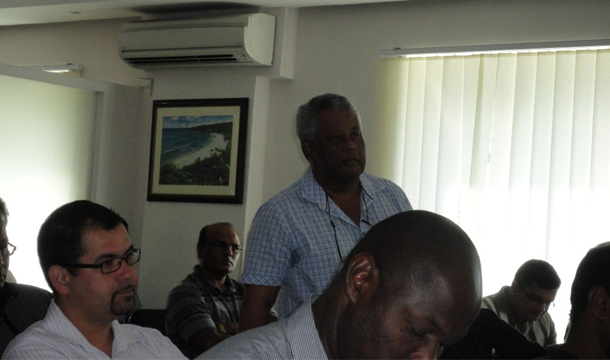
The meeting was chaired by the Minister for Finance Trade and Investment, Mr Pierre Laporte.
Also present at the meeting were the Minister for Home Affairs and Transport, Mr Joel Morgan, the Minister for Labour and Human Resource Development, Ms Idith Alexander, high officials from these respective Ministries, representatives from the Seychelles Licensing Authority, and the Office of Fair Trading.
A number of recommendations from the side of the construction companies were put forward during the meeting. The Government suggested that given the differences in the proposals of the two sides, a meeting be held between the construction companies and the Truck Operators Association, which the government would facilitate, to allow them to put forward their concerns through a further consultative process vis-a-vis each group’s mode of operation with a view to come to a favourable and shared solution.
One of the other positive outcomes of the meeting was a suggestion by the construction companies to revive an association for the sector. This move was highly welcomed by the government as it will facilitate consultations.
The meeting ended with the Ministers noting that, ‘The government will take on board your own concerns and recommendations and they will be presented before the Consultative Committee along with those from the Truck Operators Association which will all be taken into consideration before making any decision’.
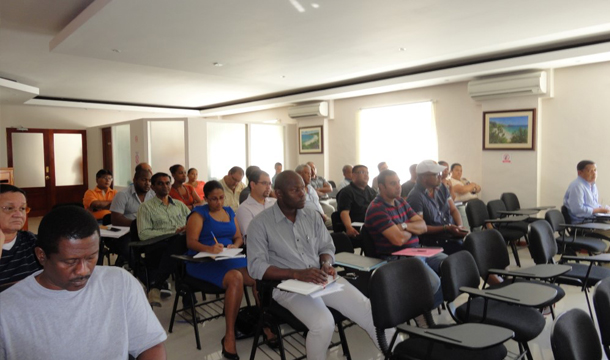
NHRDC talks at the School of Advanced Level Studies
The 19th February 2013 saw the first of a series of talks, aimed at post-secondary school students, for the first year students at the School of A Level Studies. This was delivered by the Chief Executive Officer of the National Human Resource Development Council (NHRDC) who was accompanied by a Human Resource Officer. This meeting was followed by another one on the 26th February with the second year students at the same school.
The purpose of the talks were to inform the students of the different careers and training opportunities available to them, upon the successful completion of their studies, since many of them were still undecided about which career path they could opt for based on their field of studies.
After being welcomed by Mrs Pillay, the students were given an overview of the roles of the NHRDC which is to develop human resources to be able to counter the shortage of skilled professionals in different sectors of the economy. Ms Francoise Mein, the Director for Training and Development, emphasized that the key to accomplishing this is through the provision of training and education.
The current situation of the labour market was explained to the students and sectors experiencing a shortage of labour, such as Business and Finance, Education, Health, Engineering, Agriculture and Fisheries and Maritime were highlighted. Students were informed of the importance of selecting employment opportunities that are in markets where there is a need or careers that feature on the national priority list.
The reason behind this is because the career choices selected by students and the labour market shortages are cross checked by the NHRDC to be able to compile a scholarship list. This list can then be presented to the students in order to finalise their course.
The different scholarship schemes currently on offer by the NHRDC and the names of the different Universities where students can study were outlined as was the High Achievers Policy.
”This is a policy where students who obtain three straight A’s are awarded a wider choice of where they want to study provided that it is one of the careers featured on the priority list” explained Mrs Pillay.
The talk ended with a round of questions from the students where their doubts and uncertainties were clarified. Mrs Pillay thanked the students for their participation and told them to feel free to visit the NHRDC offices for guidance and counseling should they have any more queries.
The students we spoke to after the presentations said that they found the talk very informative and that they now felt more confident about making their career choice.
During the year, NHRDC will also conduct talks in Secondary Schools and, new for this year, with upper Primary School students so that they will be better informed when it comes to making career and training choices for their future
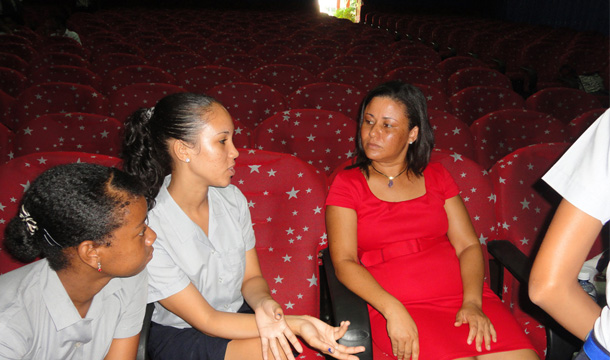
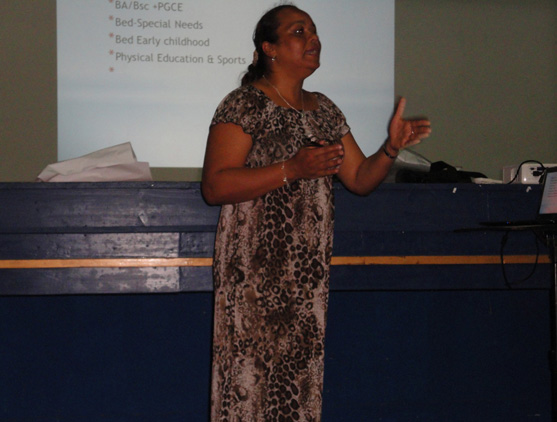
Ministerial visit to Herman Maria Construction Company, Providence
This morning, the Minister for Labour and Human Resource Development, Ms Idith Alexander, accompanied by several high officials from her Ministry visited Herman Maria Construction Company situated at Providence Industrial Zone. This visit is in line with the Ministry's policy of familiarizion with the private sector with the view of enhancing its partnership with this sector.
The Ministerial delegation was greeted by the Administration and Financial Controller, Mrs Cecile Maria who proceeded to take them on a guided tour of the premises. During the visit, the Minister spoke to staff members from Administration, Finance and the Workshop. The majority of them expressed that they were happy with their work conditions.

'I see that many of your staff have been with your Company for numerous years, so whatever it is you are doing to inspire their loyalty, keep it up' commented the Minister to Mrs Maria upon hearing one staff mention that he had been with the company for 35 years.
Discussions focused around the quality and dedication of students from Post Secondary Institutions. Although Mrs Maria acknowledged that there are some very good student and a few of them have even been employed by her Company.
The Minister assured the Company of her Ministry's support and assistance assist with the provision and the recruitment of reliable and responsible candidates when so required.
Mrs Maria thanked the Minister for the visit and added that she is open to the idea of recruiting individuals who have completed or are on the Skills Development Schemes with the Ministry as well as Secondary 5 students who have expressed interest in Construction should they have a need for new staff.

The visited ended with a viewing of the completed housing units built at Ile Perseverance by the Herman Maria Construction Company which was an opportunity to talk to the workers on site.
Minister for Labour and Human Resource Development meets with former president
The Minister for Labour and Human Resource Development, Ms Idith Alexander was warmly welcomed by the former President, Mr James R. Mancham at his residence Glacis-sur-mer on Monday 11th March 2013, to discuss pertinent issues in regards to employment.
In this vein, a comprehensive Manpower Policy; non-Seychellois workers and productive employment were the main issues discussed in relevance to the growing challenges on the labour market.
Former President Mancham pointed out that it is imperative for the Ministry of Labour and Human Resource Development to work in close collaboration with the Ministry of Education, with the view to achieve their common objectives. Meaningful consultations between the two Ministries will ensure that the education system and tertiary training respond to future needs of the industry, thereby ensuring that Seychellois are employable and benefit from the job opportunities available in the country.

In this regard, it was mutually agreed that the Ministry should continue to ensure proper management of non-Seychellois workers and provide conducive working conditions to retain graduates.
Former President Mancham also welcomed the opening of the Mont Royale Centre as he advised that drug abuse is indeed affecting our workforce and livelihood of many individuals. Further to this, it was suggested that we need to continuously educate the population, especially workers in the tourism industry on the right attitude to ensure that customer service in local tourism establishments is of quality and reflects the brand that is being promoted for the country.
It was also proposed by Mr Mancham for topical issues in relevance to employment to be discussed at round table discussions, so that the general public has the chance to share their views, whilst the Ministry is given the opportunity to clarify certain issues, so that the population is well informed on the policy direction of the Ministry.
Minister Alexander expressed her appreciation towards the relevant points raised by Former President Mancham. The Minister reassured Mr Mancham that strategies to address these challenges are already incorporated in her Ministry’s action plan for this year. Both agreed to further pursue collaborations in the future and to support the Ministry’s objectives for the betterment of the country.

Employment agencies decentralised to district level
People who are searching for a job can now either go to their respective district administration or a regional centre which covers their district to apply for employment.
The Minister for Labour and Human Resource Development Idith Alexander yesterday visited private employment agencies as well as regional labour officers stationed in various district administrations on Mahe.
She was accompanied by her principal secretary Veronique Bresson, special advisor on community development Dan Frichot, and a number of other senior officials from her ministry.

Minister Alexander said they have placed employment officers in district administrations since August to make jobseekers’ efforts easier, help them with follow-up work on their job applications and make sure they manage to get a job.
“Employment officers’ roles are to make easier the work of those seeking employment, help them with the necessary processes, liaise with employment agencies and do follow-up work after the jobseekers get employed,” she said.
“Since the placing of employment officers at district and regional level is a new move, we are now monitoring it to ensure that the process is implemented well.”
After visiting the JobPlus agency at Oceangate House, Minister Alexander also visited HEG agency at Roche Caiman, SMS agency at Anse Aux Pins as well as regional labour officers at Bel Ombre, Anse Etoile and Mont Fleuri.
She remarked that statistics have doubled for job placements at the JobPlus agency.“Last month JobPlus helped 65 people get jobs, and this month – helped by the new measures we have put in place – they have managed to place over 140 people in employment, which are very encouraging figures,” she said.
“There are still areas for improvement though, such as communication. We need to better our ways of passing on information.”
She added that new measures also looking into include welfare cases.
“When a person comes to apply for social welfare at a district administration, the welfare officer will check if the person is in employment. If not, then the person is immediately referred to the employment officer, who will contact the various job agencies to enable the person to get a job. Others who might not necessarily qualify for a job are referred to certain schemes put in place by the government, where they can get the necessary skills to join the world of work,” she said.
The minister also asked employers to make sure that job cards are returned promptly when people get employed, as it affects their statistics collection efforts.
Jobseekers are encouraged to contact their district administrations to get dates and time that they can see employment officers to register and file their job applications.
New project aims to modernise employment laws
A new committee is working to improve Seychelles employment laws and working conditions under a decent work concept initiated by the International Labour Organisation (ILO) in 2004.
Since then, many member states have developed programmes at national level to make easier processes to improve their country’s working conditions.
The project to be implemented is called the Seychelles Decent Work Country Programme, which was signed in November 2011 by the then Minister for Education, Employment and Human Resources Macsuzy Mondon and the Regional Director for Africa Charles Dan.
The committee had its first meeting recently at the Independence House.
For their five-year mandate, the committee will aim to build capacity of Seychellois workers in various sectors through technical agreements with the ILO. A national project is due to be implemented to modernise employment laws in Seychelles, mechanism in place to deal with these issues and how to apply these laws in a just manner for the benefit of all workers.
Funding for the project will be jointly done by the Seychelles government and the ILO, with the former injecting 60% of total costs expected to be around R5 million, and the ILO 40%.
The committee’s chairperson and project manager Jules Baker said they intend to work on the quality of employment in Seychelles, where for example, salaries are in accordance with the work done.
“We will ensure that, for example, men and women who do the same kind of job do not get a different salary, they should on the contrary get the same pay if they do the same amount of work or work of equal value,” he said.
“We will also work on social dialogue, where we will hold consultations on national level to further our talks with stakeholders.”
Mr Baker said the project is important to Seychelles and that the committee members were appointed by the minister herself and he asked the members to take ownership of the project and its implementation.
Mrs Mondon said the programme is about promoting rights at work, employment opportunities and social dialogue and work has started since last year.
“The programme is there to reach out to workers, job seekers, young people and the public in general and I’m happy the committee is meeting, since work has started on the programme,” she said.
“The project identified three priorities, which are to review existing legislation, strengthening the dispute/resolution system, promote quality employment, reduce unemployment especially among women and youth and promote effective tri-partism and social dialogue,” she said.
“We face many challenges in the labour market today and through this programme these challenges will be addressed and the result will be decent work for each and everyone in the country and the committee is tasked with monitoring and evaluating per the objectives set.”
There will also be training sessions held by the ILO to ensure the programme is well managed and sessions and modalities are already under negotiations with the ILO.
Decent Work Country Programme-Current Developments
The Ministry of Labour and Human Resource Development (MLHRD) in collaboration with the International Labour Organisation (ILO) organised a workshop for the Review of the Seychelles Decent Work Country Programme on Tuesday 23rd July 2013 followed by a Training based on Result Based Management of the DWCP from 24th to 25th July, 2013.
The review workshop and Result Based Management training focused on evaluating the performance of the activities undertaken so far under the programme, whilst assessing its progress, challenges and relevance with applicable recommendations on the way forward for its effective implementation. This is further to the consultancy undertaken by Mr. William Zarine on the review of the current DWCP of Seychelles.



Minister Alexander addresses 101st International Labour meet
The youth employment crisis was the focus of an address by the Minister for Labour and Human Resource Development Idith Alexander at the 101st conference of the International Labour Organisation (ILO) being held in Geneva, Switzerland.
The conference this year, being held from May 30 to June 14, is focusing on the activities of the ILO during the past two years which sought to address the impact of the daunting challenges of the global economic crisis on employment.
Other specific items being discussed are youth employment crisis; social protection floor and fundamental principles and rights at work.
In her address to the conference on Friday, Minister Alexander put strong emphasis on the youth employment crisis which has been recognised as a global challenge by the ILO.
Minister Alexander stressed that “ILO constituents need to create conducive conditions for decent work to be realised”.

She urged “ministries of Labour to be pro-active and remain committed to the needs of workers and jobseekers especially during the economic crisis” and she called on “international organisations to initiate sustainable approaches that remain relevant in times of crisis”.
The minister added that as a result of the “global youth employment crisis, feasibility policies and comprehensive solutions must be developed to renew confidence of our young people in our strategies”.
From a national perspective, the minister equally acknowledged that “youths form the majority of jobseekers due to the difficulty to secure decent work, strict requirements by employers and the high expectations of the young people”.
She noted that “when expectations of young people are not met instantly, youths become discouraged to work and settle for employment opportunities that are not necessarily of their interest. As a consequence, this creates mobility of young workers and eventually – unemployment”.
Minister Alexander informed the conference that the government of Seychelles recognises that a “young productive workforce is important towards the growth of its economy.
“Seychelles invests a considerable budget every year to implement skills development programmes to train unskilled and inexperienced young male and female jobseekers to facilitate employment among the youths,” she said.
Additionally, “the Ministry of Labour and Human Resource Development is bridging the ‘experience gap’ through close partnership with employers to develop incentive packages to attract and recruit young jobseekers. New school-to-work strategies will also be initiated in secondary and post secondary schools to better prepare our young people for the world of work,” she added.
Minister Alexander took the opportunity to thank the outgoing director general of the ILO, Juan Somavia, for his support to Seychelles during his term of office and she congratulated Guy Ryder for his appointment as the new director general.
The annual International Labour conference also creates opportunities for Seychelles to strengthen its technical cooperation activities with the ILO. More technical and financial assistance to Seychelles is forthcoming from the organisation, of which the ministry will communicate further information after the conference.
Other members of the Seychelles delegation attending the ILO conference are Jules Baker, director general of Employment Promotion Division; Susan Morel, director Policy Planning and Research; Antoine Robinson representing the workers’ union and Michelle Labrosse representing the employers’ federation.

